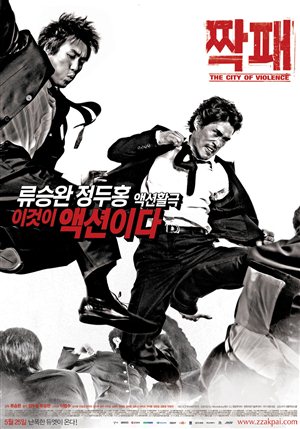
JJAKPAE (CITY OF VIOLENCE)
Korea, 2006, 93 minutes, Colour.
Directed by Seung- wan Ryoo.
We would not be surprised at the end of this urban action thriller to see it dedicated to Quentin Tarantino. Not only is it the kind of film he admires, it pays homage to him (or imitates him) especially in the final banquet scene where everybody coming out of the theatre is probably saying, “Kill Bill”. The two heroes take on wave after wave of bodyguards and henchmen and, especially, a glamorous henchwoman, and vanquish the lot – though not without a downbeat ending.
The core action could take place anywhere. The special effects and stunts are very Asian. A Seoul detective in an overbusy precinct gets a call to persuade him to come to a childhood friend’s funeral. We have seen the killing by thugs in a street in the opening credits. As the friends and associates gather for the wake, people want answers. The detective stays behind in the regional city and discovers quite a tangle of political and financial corruption, kickbacks, frauds and swindles – and some getting rid of opposition and hindrances to casino development plans by murder.
As the plot gathers pace, mysteries are solved but an even greater mystery is opened up as to what makes the villain of the piece tick. This is the most interesting aspect of the drama, especially with the flashbacks to teenage years in the mid-1980s when five young men enjoyed the rough and tumble with local gangs and promised to come together in twenty years when they are successful. That becomes sadly ironic when we realise that friendships can be deeply contaminated and lead to envy and brutality.
There are plenty of fights with the detective played by an action star who does his own stuntwork (Jung Doo-hong) and the director himself getting in on the act for the grand finale.
The Korean film industry has shown itself more than adept with this kind of film, sometimes realistic, sometimes cartoonish as it blends serious issues with hyper-martial arts.
1.The popularity of this kind of action film in the Korean industry of the 21st century? The influence of the Hong Kong film industry? The police story? Political corruption? Action?
2.The homage to Quentin Tarantino, Kill Bill? The reprisal of the popular Hollywood ingredients of the childhood friends, their growing up, separating, clashing? How well used? The familiar stories of political corruption and building development, casinos?
3.The initial murder, the back alleys of the city? The bars and restaurants? The shadows on the wall? Setting a tone? The transition to Seoul, the crowded police precinct, the tough fat men wit their tattoos, asleep at the desk, the inspector? The crowdedness in the precinct? The violence? Setting the tone?
4. The phone call, the police officer being asked to come back home, the death of his friend? His return? Meeting the widow and her grief? Meeting his other friends? The ceremony, his reverence to the dead man? The meal? The drunken friend and his praising the dead man, helping him to study law? The other members of the group, the focus on Pil-ho? His being in charge? His friendship with the police officer, their memories? The other young friend?
5.The flashbacks, the young men twenty years earlier, as a group, going out together, getting into fights, fighting the gangs, running away, jumping the weir, returning, the end of the day and their battles? Having the bottle, hiding it – and the promise to meet again in twenty years, after they had all succeeded? The continued flashbacks and the various aspects of the personalities? When they were young?
6.The situation in the city, the unknown attackers of the owner of the bar? His being a petty criminal? The flashback, the re-creation of the bar situation, the young men, the challenge, trashing the bar, the owner and his pursuit, his being killed?
7.Pil-ho and his connections, wanting to investigate? The discovery by the audience about the casino, about the bosses from Seoul, their stances, business deals and corruption, Pil-ho and his having to make things easy with local authorities? The issues of people’s land, being reclaimed? The gradual revelation of Pil-ho as the villain, his seeming respectable, his organising killings, the fact that he had killed his childhood friend, the young man and his parents and their deaths, the funeral? His apology and being too busy to come to the funeral? His double deals, the money?
8.The police officer, his concern, his friend, the investigation? The discussions with Pil-ho? Pil-ho taking him to the sauna – as he had taken others to the sauna, threatened torture, made them agree to deals? The bashing of the officer? The revelation of Pil-ho as the complete villain?
9.The building of the casino, the press conference, the photos, the taking over of the land? The build-up to the celebration, the dinner?
10.The officer, his discussions with the widow, her being torn between her brother and her husband? The young man, joining forces?
11.The two men going to the dinner, Pil-ho and the Seoul authorities, their praising him, then starting to criticise, seeing him as local, not polished? His growing anger, resentment? His memories of the past, how everybody had put him down? Motivation for his later career?
12.The two and the Kill Bill style fight, the choreography, the range of enemies, the guards, the men at the table, Pil-ho’s personal guards, the Seoul guards? Fighting their way through? The final confrontation? The officer and his being wounded, his death? The young man surviving after killing Pil-ho?
13.The final scene, the memories of the past, the bottle, the talk about what would happen in twenty years’ time – and the irony of what actually happened?